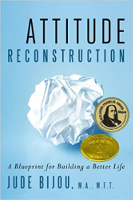
Image by Gerd Altmann
Do you feel like you're never enough? That there's never enough time? Money? Friends? Great opportunities? Recognition? Do you believe if you had or did something else -- got married, earned more, were thinner, danced better, or had more time -- you'd finally relax and feel okay?
Do you believe more is better? Are you rarely satisfied? Do you feel deprived, unworthy, or anxious no matter how hard you try or what you do? Do you secretly measure everything against an invisible standard and come up lacking?
If you answered "yes" to any of these questions, you are not alone. The price you pay for being stuck in "not enough" thinking is that you are engaged in a never-ending struggle, reaching for more to appease restlessness and affirm your self-worth. Your tendency to constantly measure what comes your way leaves you feeling unfulfilled, inadequate, or dissatisfied.
A "not enough" attitude is something we develop by comparing ourselves to what we see around us. It is triggered by the messages we receive from our caretakers, family members, peers, and the media. We are by nature outwardly focused and consequently tend to judge ourselves and our lives. It's easy to lose sight of the reality that what we have is what we have. We need to find a way to be satisfied with that.
The Cost of a "Not Enough" Attitude
"Not enough" thinking seeps into three distinct areas: how we view ourselves, other people and situations, and time. Thinking about ourselves, we chant, "I'm not good enough," or "I'm not doing enough." Thinking about other people and things, we recite, "What's coming my way isn't enough," or "You're not enough." And when thinking about time, our familiar refrain is, "There's never enough time."
Having this scarcity mindset, keeps us wanting and never satisfied. To change and move out of this deep-seated attitude, we must do some inner work. Depending on our particular "not enough" stuff, we must rigorously focus on what enriches us, see the good in others and situations, and learn to enjoy what we possess right now.
* If you feel as if you are not enough: Shift your focus to accept who you are, what you have, or what you've been given right now.
* If you think what is presented in the outside world isn't enough: Look for the good and accept and appreciate people, things, and situations, the way they are.
* If it seems like the timing should be different: Relax and accept this moment and find the positive in the present.
How To Change "Not Enough" Thinking
Being that "not enough" thinking is so insidious, it's going to take a full-frontal assault to neutralize its power. That means rigorously identifying and interrupting your constant labeling when it arises. A good place to start is to write down your own spin on "not enough."
Once you have identified your destructive thinking in these three areas, choose statements from below that correspond with your "not enough" stuff. You probably will need a phrase for each focus -- yourself, others and the world, and time to truly combat all your "not enough" thinking.
For a focus on yourself
* My presence is enough.
* I am good enough.
* I've done enough.
* My life is enough.
* I am fully satisfied with myself.
For a focus on other people and situations
* This is enough.
* I have enough.
* My friends are enough.
For a focus on time
* Enjoy the moment.
* I have enough time.
* There is enough time.
Write down the ones that apply to you, usually one from each category.
Now you're armed to change your old thinking. When you find yourself in your old "not enough" thinking, immediately replace it with your new thought.
A necessary powerful tool to accelerate the process of changing your “not enough” thinking about yourself, others, and situations is to select one statement and repeat it over and over. Do this like a meditation, focusing on the words and ignoring all the interrupting thoughts that seek to sabotage you victory.
I suggest you set a timer and repeat your chosen phrase out loud in two-minute blocks, or longer. (The ideal is five two-minute blocks at a sitting.) Repeat this exercise at least twice a day.
And better yet, repeat your chosen truths silently and aloud all throughout the day and night, like background music, interrupting all the competing thoughts.
Making the transition to having enough, being enough, and doing enough may take a while. With each interruption of the old and repetition of the new, you'll feel the sweet taste of success. Victory will be yours!
The Benefits of Finding Enough
The biggest bonus in your endeavor to rid yourself of this black and white thinking is that you will experience much more contentment. Your attention shifts to appreciating what is already here and who you already are.
This doesn't mean you don't speak up when you disagree, you just do it without a not-enough attitude.
You feel more empowered because you become fully satisfied with yourself and more accepting of what you and others say and do - recognizing we're all unique human beings doing our best. And finally, you'll be more able to enjoy life and marvel at your abundance.
©2023 by Jude Bijou, M.A., M.F.T.
All Rights Reserved.
Book by this Author:
Attitude Reconstruction
Attitude Reconstruction: A Blueprint for Building a Better Life
by Jude Bijou, M.A., M.F.T.
 With practical tools and real-life examples, this book can help you stop settling for sadness, anger, and fear, and infuse your life with joy, love, and peace. Jude Bijou's comprehensive blueprint will teach you to: ? cope with family members' unsolicited advice, cure indecision with your intuition, deal with fear by expressing it physically, create closeness by truly talking and listening, improve your social life, increase staff morale in just five minutes a day, handle sarcasm by visualizing it flying by, carve out more time for yourself by clarifying your priorities, ask for a raise and get it, stop fighting via two easy steps, cure kids' tantrums constructively. You can integrate Attitude Reconstruction into your daily routine, regardless of your spiritual path, cultural background, age, or education.
With practical tools and real-life examples, this book can help you stop settling for sadness, anger, and fear, and infuse your life with joy, love, and peace. Jude Bijou's comprehensive blueprint will teach you to: ? cope with family members' unsolicited advice, cure indecision with your intuition, deal with fear by expressing it physically, create closeness by truly talking and listening, improve your social life, increase staff morale in just five minutes a day, handle sarcasm by visualizing it flying by, carve out more time for yourself by clarifying your priorities, ask for a raise and get it, stop fighting via two easy steps, cure kids' tantrums constructively. You can integrate Attitude Reconstruction into your daily routine, regardless of your spiritual path, cultural background, age, or education.
For more info and/or to order this book, click here. Also available as a Kindle edition.
About the Author

Jude Bijou is a licensed marriage and family therapist (MFT), an educator in Santa Barbara, California and the author of Attitude Reconstruction: A Blueprint for Building a Better Life.
In 1982, Jude launched a private psychotherapy practice and started working with individuals, couples, and groups. She also began teaching communication courses through Santa Barbara City College Adult Education.
Visit her website at AttitudeReconstruction.com/




























